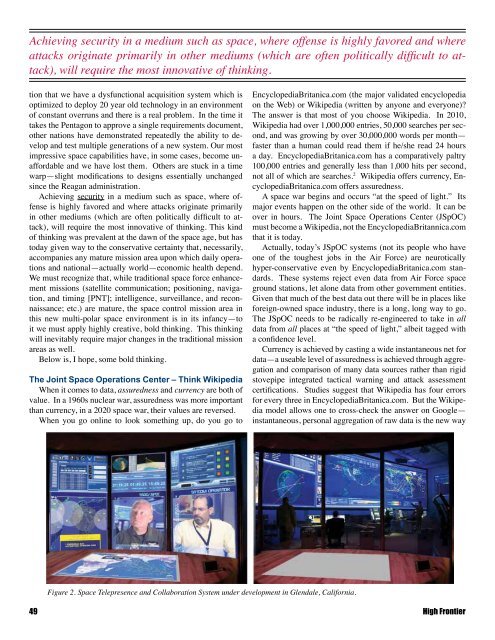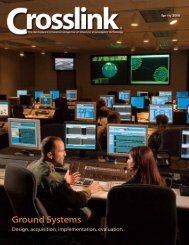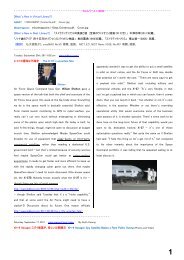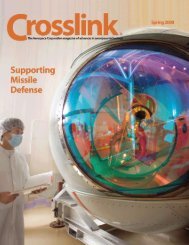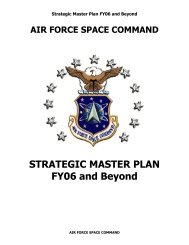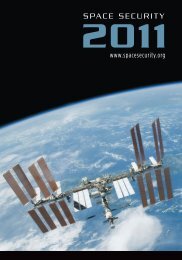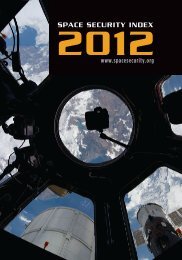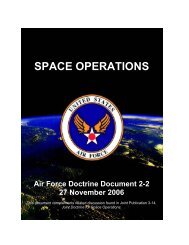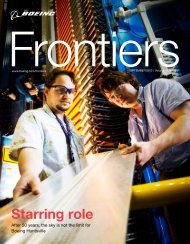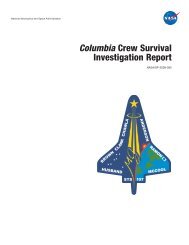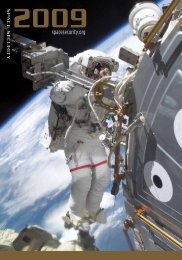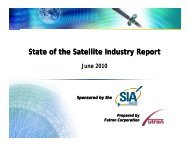Schriever Wargame 2010 - Air Force Space Command
Schriever Wargame 2010 - Air Force Space Command
Schriever Wargame 2010 - Air Force Space Command
Create successful ePaper yourself
Turn your PDF publications into a flip-book with our unique Google optimized e-Paper software.
Achieving security in a medium such as space, where offense is highly favored and where<br />
attacks originate primarily in other mediums (which are often politically difficult to attack),<br />
will require the most innovative of thinking.<br />
tion that we have a dysfunctional acquisition system which is<br />
optimized to deploy 20 year old technology in an environment<br />
of constant overruns and there is a real problem. In the time it<br />
takes the Pentagon to approve a single requirements document,<br />
other nations have demonstrated repeatedly the ability to develop<br />
and test multiple generations of a new system. Our most<br />
impressive space capabilities have, in some cases, become unaffordable<br />
and we have lost them. Others are stuck in a time<br />
warp—slight modifications to designs essentially unchanged<br />
since the Reagan administration.<br />
Achieving security in a medium such as space, where offense<br />
is highly favored and where attacks originate primarily<br />
in other mediums (which are often politically difficult to attack),<br />
will require the most innovative of thinking. This kind<br />
of thinking was prevalent at the dawn of the space age, but has<br />
today given way to the conservative certainty that, necessarily,<br />
accompanies any mature mission area upon which daily operations<br />
and national—actually world—economic health depend.<br />
We must recognize that, while traditional space force enhancement<br />
missions (satellite communication; positioning, navigation,<br />
and timing [PNT]; intelligence, surveillance, and reconnaissance;<br />
etc.) are mature, the space control mission area in<br />
this new multi-polar space environment is in its infancy—to<br />
it we must apply highly creative, bold thinking. This thinking<br />
will inevitably require major changes in the traditional mission<br />
areas as well.<br />
Below is, I hope, some bold thinking.<br />
The Joint <strong>Space</strong> Operations Center – Think Wikipedia<br />
When it comes to data, assuredness and currency are both of<br />
value. In a 1960s nuclear war, assuredness was more important<br />
than currency, in a 2020 space war, their values are reversed.<br />
When you go online to look something up, do you go to<br />
EncyclopediaBritanica.com (the major validated encyclopedia<br />
on the Web) or Wikipedia (written by anyone and everyone)?<br />
The answer is that most of you choose Wikipedia. In <strong>2010</strong>,<br />
Wikipedia had over 1,000,000 entries, 50,000 searches per second,<br />
and was growing by over 30,000,000 words per month—<br />
faster than a human could read them if he/she read 24 hours<br />
a day. EncyclopediaBritanica.com has a comparatively paltry<br />
100,000 entries and generally less than 1,000 hits per second,<br />
not all of which are searches. 2 Wikipedia offers currency, EncyclopediaBritanica.com<br />
offers assuredness.<br />
A space war begins and occurs “at the speed of light.” Its<br />
major events happen on the other side of the world. It can be<br />
over in hours. The Joint <strong>Space</strong> Operations Center (JSpOC)<br />
must become a Wikipedia, not the EncyclopediaBritannica.com<br />
that it is today.<br />
Actually, today’s JSpOC systems (not its people who have<br />
one of the toughest jobs in the <strong>Air</strong> <strong>Force</strong>) are neurotically<br />
hyper-conservative even by EncyclopediaBritanica.com standards.<br />
These systems reject even data from <strong>Air</strong> <strong>Force</strong> space<br />
ground stations, let alone data from other government entities.<br />
Given that much of the best data out there will be in places like<br />
foreign-owned space industry, there is a long, long way to go.<br />
The JSpOC needs to be radically re-engineered to take in all<br />
data from all places at “the speed of light,” albeit tagged with<br />
a confidence level.<br />
Currency is achieved by casting a wide instantaneous net for<br />
data—a useable level of assuredness is achieved through aggregation<br />
and comparison of many data sources rather than rigid<br />
stovepipe integrated tactical warning and attack assessment<br />
certifications. Studies suggest that Wikipedia has four errors<br />
for every three in EncyclopediaBritanica.com. But the Wikipedia<br />
model allows one to cross-check the answer on Google—<br />
instantaneous, personal aggregation of raw data is the new way<br />
Figure 2. <strong>Space</strong> Telepresence and Collaboration System under development in Glendale, California.<br />
49 High Frontier


